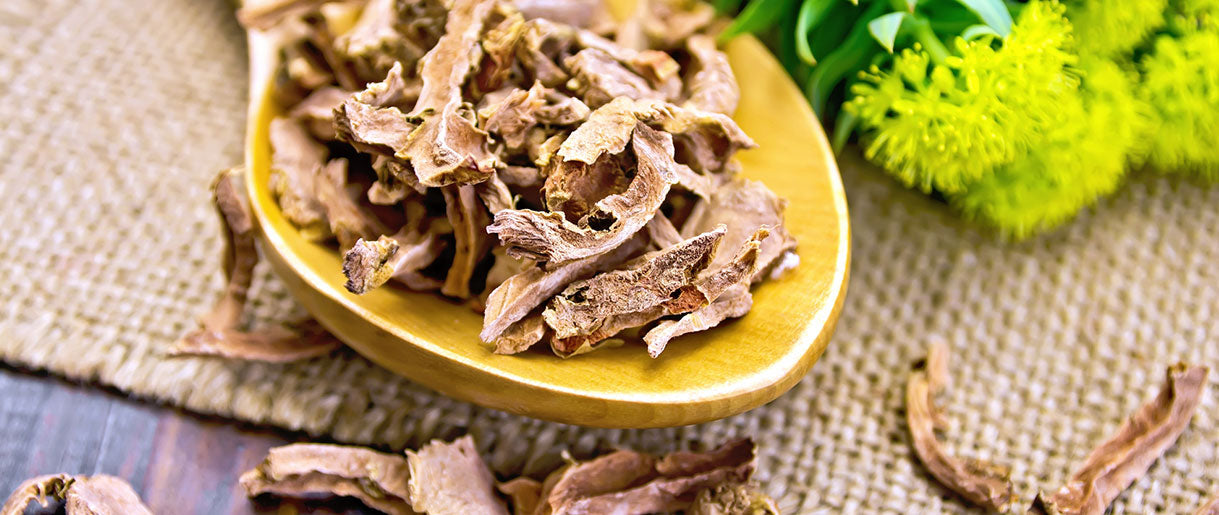Adaptogens are a class of plants known for their potential to help the body resist different kinds of stressors. Some adaptogens, such as Rhodiola Rosea, Ashwagandha, Holy Basil, Ginseng, and Cordyceps, may support weight loss in conjunction with a healthy diet and regular exercise.
They are believed to aid in weight control by modulating stress responses, enhancing energy metabolism, and balancing hormones. However, while some studies show promising results, more comprehensive research is needed to understand their effectiveness fully.
This article delves into the fascinating world of adaptogens, exploring how they may contribute to weight loss. We'll closely examine various types of adaptogens, how to incorporate them into your lifestyle, and the current scientific research surrounding their use.
Unveiling Adaptogens: Nature's Stress Busters

Adaptogens, a term coined by Russian scientists in the mid-20th century, refers to a unique class of plants known for their stress-resistant properties. Adaptogens are plants that support the body's ability to handle physical and mental stress.
These include a range of herbs and roots used in traditional medicine practices for centuries. The magic of these adaptogenic herbs lies in their ability to bring balance and harmony to the body's physiological functions, including the immune system, the stress response, and metabolic processes.
Adaptogens at Work: Balancing the Stress Response
Adaptogens function by modulating the body's stress response. Chronic stress, whether from our environment or lifestyle, can lead to various health problems, including obesity. When under stress, the body produces cortisol, a hormone that can lead to weight gain when produced in excess. Here's where adaptogens show their prowess. By helping to manage stress, adaptogens can aid in lowering cortisol levels in the body.
They are unique in their ability to help the body maintain homeostasis. While their effects can be subtle, their impact can be profound. Adaptogens respond to different states of stress in the body, supporting and enhancing physical and mental performance without overly stimulating or inhibiting. They help the body 'adapt' to stress, hence the term 'adaptogen.'
Tracing the Roots: A Brief History of Adaptogen Use
Adaptogens have been used for centuries in Ayurvedic and Chinese medicine, and more recently, they have found a place in Western holistic practices. However, the concept of adaptogens, as we understand it today, began in the Soviet Union in the 1940s. Scientists sought substances to enhance physical and mental performance while helping the body resist stress.
They found their answer in adaptogenic herbs. From enhancing endurance to fighting fatigue and boosting mental performance to helping the body resist too much cortisol, adaptogens were discovered to be a natural way to enhance physical stress resistance and manage stress without adverse effects.
The Adaptogenic Link: Aid in Weight Loss

Adaptogens for weight loss have been gaining recognition in the wellness community. While they are primarily known for their stress-reducing properties, some adaptogens may also support weight loss. How does this work? The connection lies primarily in their impact on stress and energy levels.
When the body experiences chronic stress, it produces the hormone cortisol. High cortisol levels can lead to weight gain, particularly in the form of visceral fat, which surrounds the body's internal organs. Furthermore, stress can stimulate food cravings, hindering efforts to maintain a healthy weight.
Adaptogens, by lowering stress and supporting the body's central nervous system, can help control these responses. They help balance cortisol levels, reduce stress, and may indirectly promote weight loss by supporting overall body weight management.
Grounded in Science: Research on Adaptogens and Weight Loss
Scientific studies offer insights into the use of adaptogens for weight loss. Research has shown that certain adaptogens can affect body weight, influence energy expenditure, and even reduce body fat.
For instance, studies have indicated that(1) Rhodiola Rosea can help reduce body fat and increase physical performance. One of the best adaptogens for energy, Rhodiola Rosea also boosts energy levels and exercise performance.
Research on Ashwagandha has shown it can support immune health, lower blood sugar levels, increase energy, and aid in fat loss. Other studies have looked at adaptogens like Holy Basil, which may support glucose metabolism and insulin sensitivity, critical factors in managing body weight.
Another essential factor in weight loss is maintaining a healthy digestive system. Some adaptogens, such as Astragalus root, are great supplements for supporting a healthy gut environment, which can also contribute to weight management.
Key Players: Best Adaptogens for Weight Loss
1. Rhodiola Rosea May Help Reduce Hidden Fat

The adaptogen rhodiola, often known as "arctic root" or "golden root," is frequently used to improve physical and mental performance. It has been used as a tonic and is reputed to enhance the body's capacity for stress adaptation. Rhodiola was initially used to treat altitude sickness but is now recognized as a valuable weight-loss adaptogen.
Salidroside, the main ingredient in Rhodiola, is known to stimulate the sirtuin-1 (SIRT1) pathway, a cellular and metabolic health-supporting anti-aging protein. Rhodiola inhibited muscular atrophy and dysfunction in experiments with obese mice(2) while enhancing mitochondrial function and SIRT1 activity.
Moreover, studies on animals(3) have demonstrated that combining Rhodiola with the bitter orange plant reduced visceral fat—the dangerous, "hidden" fat that envelops organs and significantly raises the risk of disease and mortality—by 30%.
A study employing two different Rhodiola rosea extracts(4) found that Rhodiola promoted the use of stored fat and inhibited the production of new fat cells (antiadipogenic actions).
Another laboratory investigation identified Rhodiola's bioactive phenolic component(5) as the cause of its antiadipogenic (weight loss) properties. The capacity of Rhodiola to stop enzyme activity and prevent the energy synthesis that results in the creation of fat cells was cited by researchers as the reason for this.
2. Schisandra Berries Promotes Insulin Release

Many benefits of Schisandra berries have been documented, including their ability to prevent cancer and obesity. Research supports the claims as well.
Schisandra is renowned for reducing stress, enhancing metabolic activity, and boosting muscle strength and endurance. It also inhibits the buildup of lipids and promotes insulin release to lower blood sugar, suggesting that it has anti-obesity potential.
Gomisin N, a plant lignan molecule with anti-cancer actions, is one of Schisandra berries' most critical bioactive components. The treatment with Gomisin N significantly decreased body weight, fat tissue mass, and serum levels of glucose, triglycerides, and cholesterol in a study with obese mice(6).
According to this study, a component of Schisandra may be therapeutically effective in preventing obesity and the dysregulated lipid indicators often associated with it.
3. Turmeric Helps Decrease BMI

Although turmeric is best known for coloring curry foods yellow, it is also an adaptogenic root with various health benefits. This is because curcumin, a member of the wider family of compounds known as curcuminoids, is an active turmeric substance.
Turmeric may aid in weight loss by lowering adipocyte proliferation, controlling inflammation, and improving insulin sensitivity. After taking 800 mg of curcumin(7) twice a day for 30 days, participants in a study who had previously reported being unable to lose weight experienced notable drops in body weight and body mass index (BMI).
4. Ginseng May Improve Muscle Energy Use

Since ancient times, traditional Chinese medicine has used Asian Ginseng as an adaptogen. It possesses "warming" or "yang" energy linked to the fire element.
According to legend, this herb stimulates the body, making it one of the best supplements for energy. Ginseng's ability to boost energy has made it popular among foods that wake people up.
Researchers, in a review on Ginseng and obesity(8), noted that Ginseng includes ginsenosides, an active herbal phytochemical, which may help in appetite management. Moreover, studies have suggested that Ginseng may lower blood glucose levels by promoting the use of energy by muscles.
Ginseng extract and ginsenosides were found to have a weight loss effect in research involving obese middle-aged women(9). According to researchers, Ginseng's potential to alter gut microorganisms causes this impact. These results suggest that Ginseng may leave a significant impact when combined with mushrooms for gut health.
A study using obese mice(10) revealed that Korean white ginseng extract had an anti-obesity effect, probably due to delaying intestines' fat absorption.
5. Maca Root Promotes Weight Loss

Peruvian native maca is a root vegetable renowned for its energizing properties. Although this stimulation is frequently marketed for its capacity to increase libido (maca and cordyceps mushroom can boost libido), it can also help with metabolism and weight loss.
Animal studies(11) have shown that consuming maca supplements can promote weight loss. For example, the average weight loss in studies using different maca dosages was 8.6%, while for higher doses, it was 14.3%. In addition, maca can also indirectly aid in weight loss by boosting energy levels and improving sleep quality, which leads to increased physical activity and motivation to exercise.
6. Licorice Root May Increase Muscle Mass

Licorice root may work well as an adaptogen to encourage metabolism and weight loss. In one research(12), obese patients were given a placebo, 300, 600, or 900 mg of licorice root oil, respectively. Compared to the placebo groups, the licorice root oil treatment groups saw significant decreases in body fat mass. Also, the subjects who took 900 mg of licorice root oil saw drops in their body weight, LDL cholesterol, and visceral fat.
According to clinical research with subjects of normal weight, Licorice intake dramatically decreased body fat mass(13). Nonetheless, it should be highlighted that licorice therapy did not affect body mass index (BMI).
Another clinical investigation, including older people, found that supplementing with licorice flavonoid oil dramatically increased muscle mass(14) and decreased body fat compared to the control group.
The administration of licorice flavonoid oil was discovered to enhance fat oxidation during light exercise in an additional clinical investigation on healthy volunteers(15). This research raises the possibility that licorice aids in fat loss.
In a study involving overweight and obese participants, a low-calorie diet with licorice extract supplementation helped reduce body weight, insulin resistance, and fat mass (16). Yet researchers also found that a low-calorie diet promoted weight loss just as well.
7. Cordyceps Mushrooms Boosts Stamina

Cordyceps mushroom is another adaptogen for weight loss. This fungus found high in the Himalayas, is renowned for its capacity to control the stress response and perhaps boost endurance.
Twenty-eight participants(17) in a clinical trial demonstrated Cordyceps militaris' capacity to increase maximal oxygen uptake, which could sustain more intense activity. Researchers noted that if supplementation continued for a more extended time, there might be more significant benefits from cordyceps.
In a study on obese mice using Cordyceps militaris extract (CE)(18), there was a decrease in body weight and a reduction in the size of fat cells. According to a different animal study, cordycepin(19), an active ingredient in Cordyceps militaris, can also help people lose weight.
Cordyceps boosts energy levels, allowing people to work out more, further supporting weight loss. This is one of the reasons cordyceps is used pre-workout.
8. Chaga Mushroom Suppresses Appetite

Chaga tea can aid in weight loss by reducing cravings. When trying to reduce weight, monitoring calories consumed is crucial, which might be simpler if hunger is suppressed.
A reduced appetite and fewer food cravings mean you consume less food, forcing the body to use energy reserves for energy production. This could eventually aid in reducing fat and contribute to weight loss.
A study found that mice given Chaga mushrooms(20) for three weeks saw some weight loss. The mushroom can also aid in weight loss by reducing stress and possibly halting cortisol synthesis.
9. Ashwagandha Improves Eating Habits

Ashwagandha, a highly sought adaptogen, is well known for supporting stress management in various ways. The active ingredient in the herbal medication is the root.
A 2016 study(21) revealed that ashwagandha root extract enhanced eating habits, decreased food cravings in the study subjects, and lowered psychological and physiological stress markers.
According to a study, taking Withania somnifera (Ashwagandha)(22) supplements made 57 young male subjects' muscles stronger and increased their mass. All subjects exercised with weights, which promotes weight loss. In addition, the study showed that Ashwagandha considerably raised testosterone levels, which is beneficial for boosting energy, motivation, and mitochondrial function.
Similar findings of elevated testosterone levels following ashwagandha intake were seen in a recent study(23). Salivary testosterone levels rose by 15% after an 8-week treatment period.
10. Holy Basil May Halt Fat Cell Development

Holy basil, or Ocimum sanctum, is a common adaptogen in Ayurvedic medicine. It has been used therapeutically for thousands of years and is frequently used to decrease stress.
Ocimum sanctum lowered body weight, lipid levels, and BMI in thirty overweight or obese patients during an 8-week study(24). According to researchers, this results from the downregulation of fat cell development. Participants in this trial received a 250mg pill twice a day.
Tulsi (holy basil) was able to lower blood glucose levels in those with type 2 diabetes, according to a comparison trial(25). Participants in this study were divided into two groups. One group received 300 mg of tulsi with an anti-diabetic medication, while the other group received simply the anti-diabetic medicines. Comparing the drug group to the tulsi-drug group, blood sugar levels dropped by 5%.
Navigating the Adaptogenic Path: Ingesting Adaptogens

Incorporating adaptogens for weight loss into your daily routine can be as simple as drinking tea or taking a supplement. For instance, holy basil and licorice root are often consumed in tea, providing a relaxing ritual and health benefits.
You can also make Chaga mushroom tea at home and enjoy the mushroom's weight loss benefits. Meanwhile, herbs like Ashwagandha are more commonly taken as a supplement, often in capsule form.
Caution on the Road: Precautions with Adaptogens
Before diving into adaptogens, it's crucial to understand that while they are generally considered safe for most people, they may not suit everyone. Pregnant or breastfeeding women, people with autoimmune diseases, and those on certain medications should consult a healthcare provider before starting any adaptogen regimen. Also, remember that the effect of adaptogens can be subtle and gradual, and they should not be relied upon as a standalone solution for weight loss.
Stepping on the Scale: Recommended Daily Intake
The recommended daily intake can vary depending on the specific adaptogen and the form you're taking. For instance, licorice root tea is generally recommended to have one to two cups per day. For ashwagandha capsules, most health professionals suggest a daily intake of around 600 to 1200 mg split into two or three doses. Again, it's best to consult a healthcare provider for personalized dosage recommendations.
Holistic Approach to Weight Loss: Multi-Faceted Approach to Shed Extra Pounds for Good

Balancing the Meal Plan: Adaptogens in a Nutritious Diet
Remember that adaptogens for weight loss should be part of a balanced diet. They can offer a helping hand but won't replace the importance of consuming nutrient-rich foods, controlling portion sizes, and maintaining regular physical activity. Combining adaptogens with a diet rich in fruits, vegetables, lean proteins, whole grains, and regular exercise can set you on the path to achieving your weight loss goals.
On the Move: The Power of Regular Exercise
While incorporating adaptogens into your diet can contribute to weight loss, it's essential to remember that regular exercise plays a pivotal role in any successful weight management plan.
Physical activity not only burns calories but also improves overall health and well-being. Whether it's a brisk walk, yoga session, or high-intensity interval training, find an activity you enjoy and make it a regular part of your routine.
Nightly Respite: Sleep's Influence on Weight Management
A good night's sleep is more than just a time for rest and rejuvenation. Adequate sleep is vital for various functions, including hormone regulation, metabolism, and appetite control, which play a significant role in weight management.
Research indicates that(26) chronic sleep deprivation can lead to weight gain. As such, ensuring you're getting sufficient, high-quality sleep each night is essential to your weight loss journey.
Balancing Act: Stress Management for Weight Loss
Stress management is another critical element in weight loss efforts. Chronic stress can lead to hormonal imbalances that stimulate cravings and weight gain. This is where adaptogens come into play, as they help the body adapt to and manage stress.
However, adaptogens should be used in tandem with other stress management techniques. These may include mindfulness practices, such as meditation or yoga, spending time in nature, journaling, or seeking the support of a mental health professional.
Navigating the Side Effects: Potential Pitfalls of Adaptogens

While adaptogens are generally considered safe, they can occasionally lead to side effects. Depending on the specific adaptogen and the individual taking it, these might include gastrointestinal issues, blood sugar changes, and blood pressure alterations.
Certain adaptogens may also interact with medications, leading to adverse effects. Therefore, you must know these potential side effects and monitor your body's responses when starting a new adaptogen regimen.
FAQs About Adaptogens for Weight Loss
What Is The Best Time Of Day To Take Adaptogens For Weight Loss?
The best time to take adaptogens for weight loss depends on the specific adaptogen and the effects you aim to achieve. Some adaptogens, like Rhodiola rosea, have energizing effects and might be most beneficial in the morning or early afternoon. On the other hand, adaptogens like Ashwagandha are known for their stress-reducing and sleep-promoting properties, making them ideal for evening use.
Consistency is vital with adaptogens, as their benefits accrue over time with regular use. Always follow the manufacturer's instructions or consult a healthcare provider to determine the best dosage and timing for your needs.
Are There Any Adaptogens That Should Be Avoided While Trying To Lose Weight?
While adaptogens are considered safe and beneficial for overall wellness, not all directly aid in weight loss. For instance, certain adaptogens like licorice root can lead to fluid retention and bloating when used in excess, which might conflict with weight loss goals.
Moreover, suppose you have a specific health condition such as high blood pressure or diabetes. In that case, some adaptogens might not be advisable due to their potential interactions with medications or their effects on blood pressure and blood sugar levels.
As with any supplement, it's crucial to research and consult a healthcare provider before beginning an adaptogen regimen for weight loss. This way, you can ensure that your chosen adaptogens align with your health needs and weight loss goals.
Can I Take Different Adaptogens Together For Weight Loss, Or Should They Be Taken Separately?
Taking different adaptogens together for weight loss is generally safe, as they can complement each other's effects. For instance, Ashwagandha might help manage stress-related food cravings, while Rhodiola rosea may boost energy and exercise performance. When used together, they could potentially amplify your weight loss efforts.
However, as each adaptogen has a different impact and potency, combining them should be done thoughtfully and preferably under the guidance of a healthcare provider. Additionally, starting with a lower dose when combining adaptogens is advisable, and gradually increasing it as tolerated to monitor for potential side effects.
How Long Does It Take To See Weight Loss Results From Taking Adaptogens?
The time it takes to see weight loss results from taking adaptogens can vary widely based on individual factors such as diet, exercise habits, stress levels, and overall health. Adaptogens are not quick-fix solutions; they work subtly and gradually, and their effects are typically seen over weeks or even months of consistent use.
Furthermore, adaptogens should not be relied upon as the primary weight loss method. They can support a weight loss regimen by helping to manage stress, balance hormones, and improve overall well-being. Still, significant weight loss results will likely come from dietary changes and increased physical activity.
Are There Specific Food Interactions To Consider When Taking Adaptogens For Weight Loss?
In general, no specific food interactions are widely recognized to impact the effectiveness of adaptogens for weight loss significantly. However, taking adaptogens in combination with a balanced, nutrient-dense diet will certainly support overall health and weight loss efforts.
It's also worth noting that some adaptogens can have a stimulating effect, so combining these with caffeine or other stimulants might lead to feelings of restlessness or jitteriness in some individuals.
Key Takeaways
In this exploration of adaptogens for weight loss, we've covered a lot of ground. From understanding what adaptogens are and their connection to weight loss to the various ways to incorporate them into your diet, we've provided a comprehensive overview of this intriguing topic. We've also delved into the importance of complementing adaptogen use with other healthy lifestyle changes and precautions when starting an adaptogen regimen.
While adaptogens hold promising potential in supporting weight loss and overall well-being, they are not a magic solution. They work best in a holistic approach, including a balanced diet, regular exercise, sufficient sleep, and effective stress management. Remember, using adaptogens should be a carefully considered decision, considering the potential side effects and your personal health conditions.
It's exciting to think about the possibilities that lie within these resilient plants. If you're embarking on a weight loss journey, consider exploring the potential benefits of adaptogens. But do so responsibly, ideally under the guidance of a healthcare professional.
We'd love to hear your thoughts on this topic. Have you tried using adaptogens for weight loss? What has your experience been? Feel free to share in the comments below. Your insights could be beneficial for others on a similar journey!
References
- Effects of Two DifferentRhodiola rosea Extracts on Primary Human Visceral Adipocytes, (1)https://www.ncbi.nlm.nih.gov/pmc/articles/PMC6272273/
- The Treatment of Rhodiola Mimics Exercise to Resist High-Fat Diet-Induced Muscle Dysfunction via Sirtuin1-Dependent Mechanisms, (2)https://www.ncbi.nlm.nih.gov/pmc/articles/PMC8082455/
- Citrus aurantium and Rhodiola rosea in combination reduce visceral white adipose tissue and increase hypothalamic norepinephrine in a rat model of diet-induced obesity, (3)https://www.ncbi.nlm.nih.gov/pmc/articles/PMC3808124/
- Effects of Two Different Rhodiola rosea Extracts on Primary Human Visceral Adipocytes, (4)https://pubmed.ncbi.nlm.nih.gov/25970041/
- Rhodiola-induced inhibition of adipogenesis involves antioxidant enzyme response associated with pentose phosphate pathway, (5)https://pubmed.ncbi.nlm.nih.gov/20623718/
- Gomisin N inhibits adipogenesis and prevents high-fat diet-induced obesity, (6)https://pubmed.ncbi.nlm.nih.gov/28067305/
- Potential role of bioavailable curcumin in weight loss and omental adipose tissue decrease: preliminary data of a randomized, controlled trial in overweight people with metabolic syndrome. Preliminary study, (7)https://pubmed.ncbi.nlm.nih.gov/26592847/
- Ginseng and obesity, (8)https://www.ncbi.nlm.nih.gov/pmc/articles/PMC5766689/
- Influence of Panax ginseng on obesity and gut microbiota in obese middle-aged Korean women, (9)https://pubmed.ncbi.nlm.nih.gov/24748834/
- Effects of Korean white ginseng extracts on obesity in high-fat diet-induced obese mice, (10)https://www.ncbi.nlm.nih.gov/pmc/articles/PMC2978305
- Short and Long-Term Physiological Responses of Male and Female Rats to Two Dietary Levels of Pre-Gelatinized Maca (Lepidium Peruvianum Chacon), (11)https://www.ncbi.nlm.nih.gov/pmc/articles/PMC3614567/
- Licorice flavonoid oil reduces total body fat and visceral fat in overweight subjects: A randomized, double-blind, placebo-controlled study, (12)https://pubmed.ncbi.nlm.nih.gov/24345587/
- Effect of licorice on the reduction of body fat mass in healthy subjects, (13)https://pubmed.ncbi.nlm.nih.gov/14594116/
- The effects of licorice flavonoid oil with respect to increasing muscle mass: a randomized, double-blind, placebo-controlled trial, (14)https://pubmed.ncbi.nlm.nih.gov/27643690/
- Enhancement of Fat Oxidation by Licorice Flavonoid Oil in Healthy Humans during Light Exercise, (15)https://pubmed.ncbi.nlm.nih.gov/26639849/
- Changes of Insulin Resistance and Adipokines Following Supplementation with Glycyrrhiza Glabra L. Extract in Combination with a Low-Calorie Diet in Overweight and Obese Subjects: a Randomized Double Blind Clinical Trial, (16)https://www.ncbi.nlm.nih.gov/pmc/articles/PMC5896387/
- Cordyceps militaris Improves Tolerance to High-Intensity Exercise After Acute and Chronic Supplementation, (17)https://pubmed.ncbi.nlm.nih.gov/27408987/
- Effect of Cordyceps militaris extract and active constituents on metabolic parameters of obesity induced by high-fat diet in C58BL/6J mice, (18)https://pubmed.ncbi.nlm.nih.gov/24231073/
- Cordycepin reduces weight through regulating gut microbiota in high-fat diet-induced obese rats, (19)https://pubmed.ncbi.nlm.nih.gov/30522511/
- Continuous intake of the Chaga mushroom (Inonotus obliquus) aqueous extract suppresses cancer progression and maintains body temperature in mice, (20)https://www.ncbi.nlm.nih.gov/pmc/articles/PMC4946216/
- Body Weight Management in Adults Under Chronic Stress Through Treatment With Ashwagandha Root Extract: A Double-Blind, Randomized, Placebo-Controlled Trial, (21)https://pubmed.ncbi.nlm.nih.gov/27055824/
- Examining the effect of Withania somnifera supplementation on muscle strength and recovery: a randomized controlled trial, (22)https://pubmed.ncbi.nlm.nih.gov/26609282/
- A Randomized, Double-Blind, Placebo-Controlled, Crossover Study Examining the Hormonal and Vitality Effects of Ashwagandha ( Withania somnifera) in Aging, Overweight Males, (23)https://pubmed.ncbi.nlm.nih.gov/30854916/
- Effect of Tulsi ( Ocimum sanctum Linn.) Supplementation on Metabolic Parameters and Liver Enzymes in Young Overweight and Obese Subjects, (24)https://pubmed.ncbi.nlm.nih.gov/28811698
- Evaluation of the antidiabetic effect of Ocimum sanctum in type 2 diabetic patients , (25)https://www.researchgate.net/publication/266885994
- Sleep deprivation and obesity in adults: a brief narrative review, (26)https://www.ncbi.nlm.nih.gov/pmc/articles/PMC6196958/









Let Us Know Your Comments